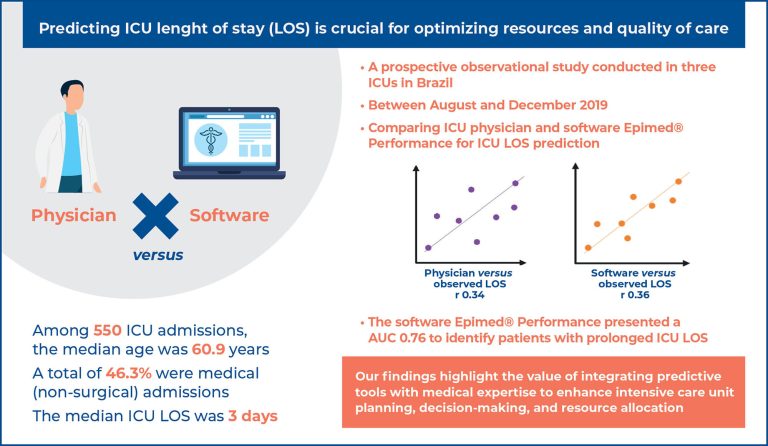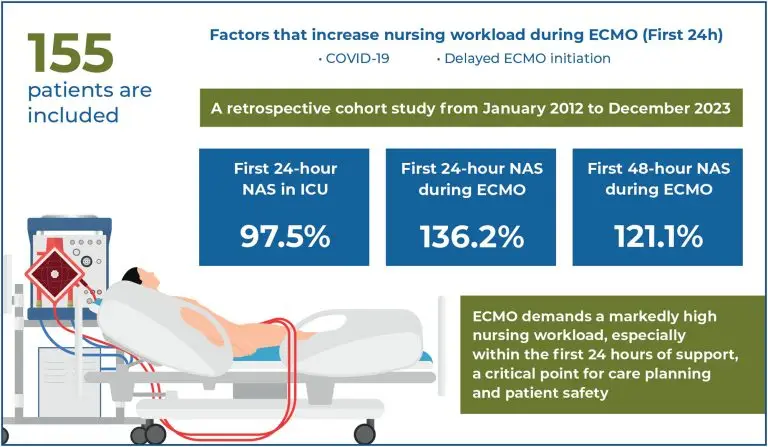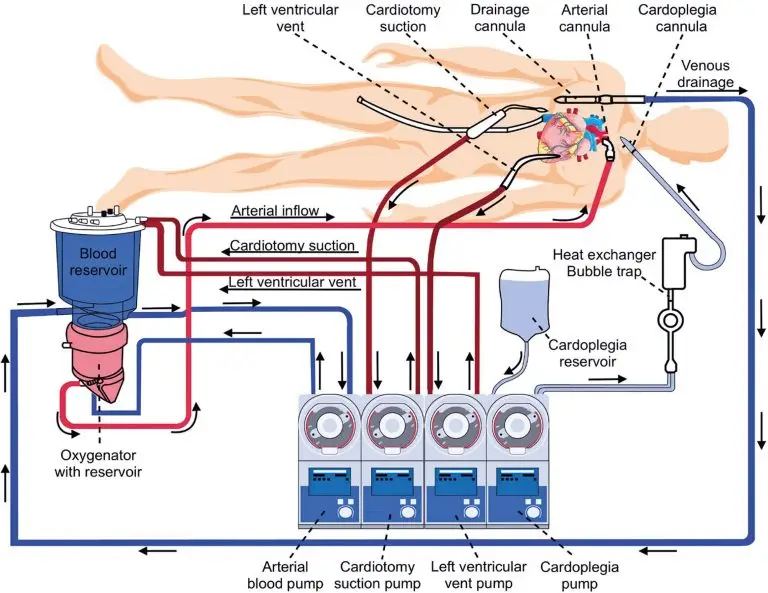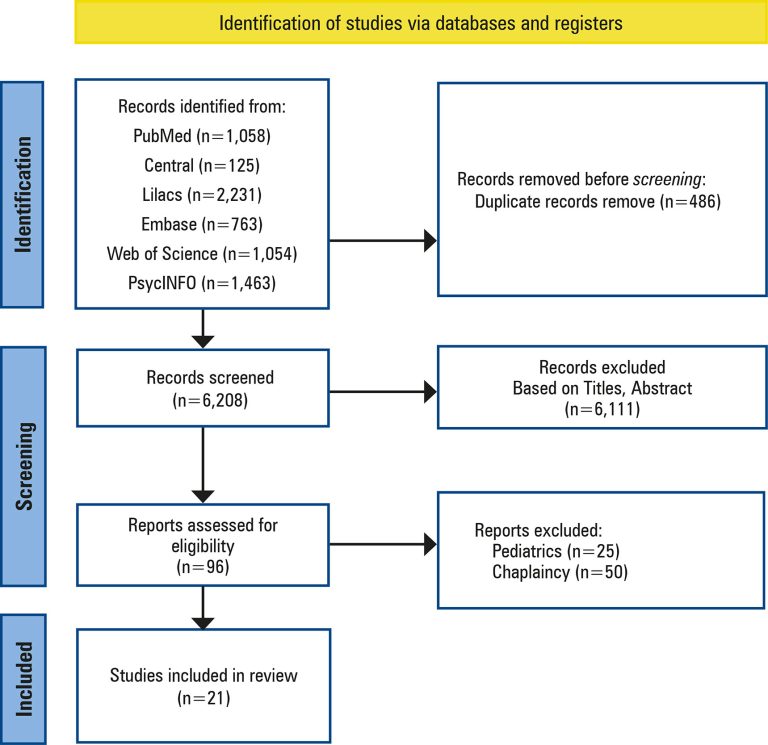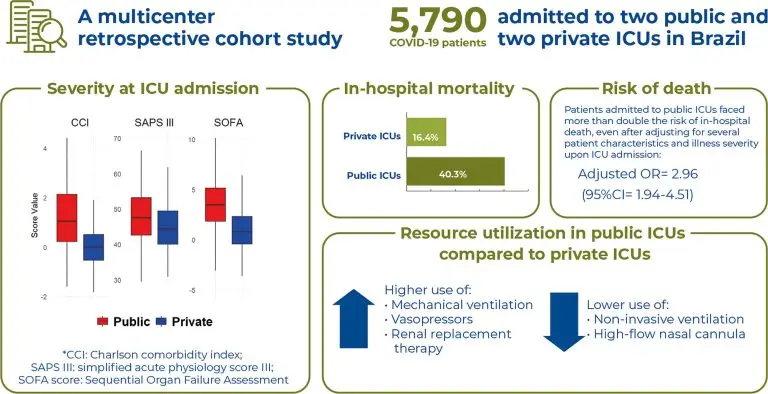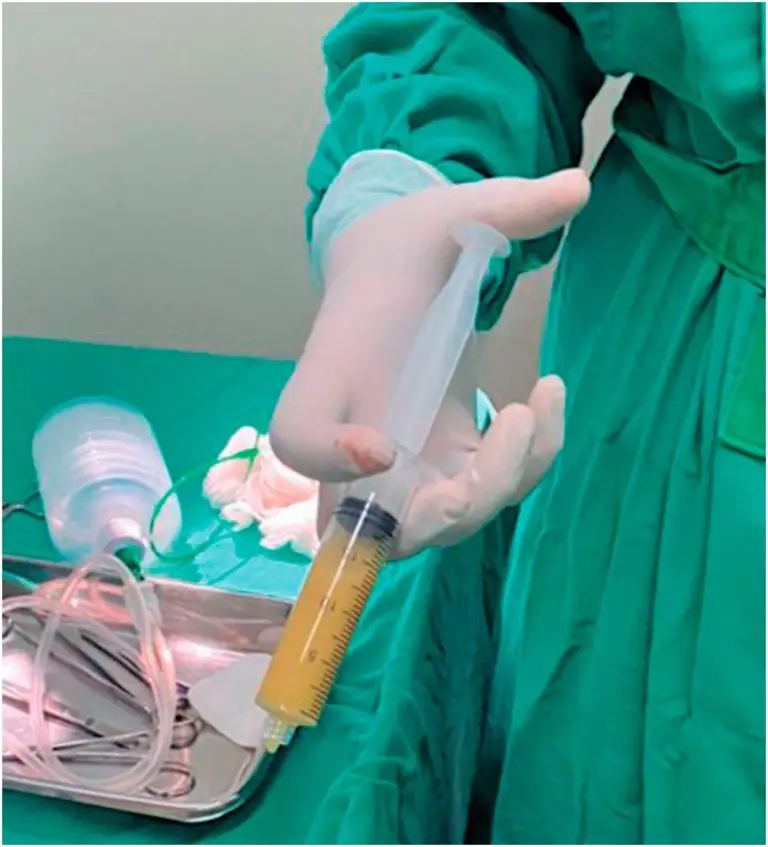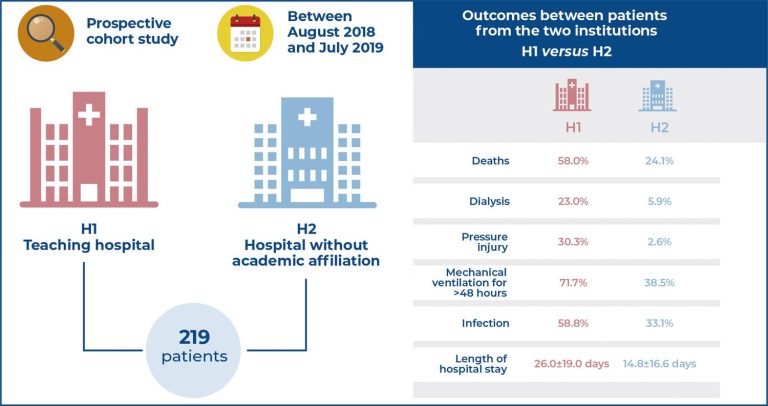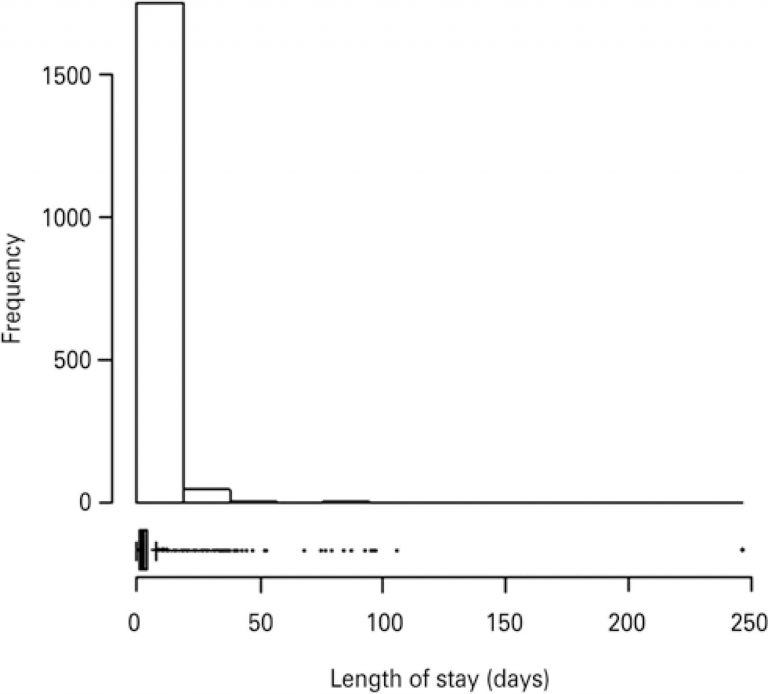25/Nov/2025
Predicting intensive care unit length of stay: comparing physician assessments with software predictions in a multicenter study
einstein (São Paulo). 25/Nov/2025;23:eAO1265.
View Article25/Nov/2025
Predicting intensive care unit length of stay: comparing physician assessments with software predictions in a multicenter study
DOI: 10.31744/einstein_journal/2025AO1265
Highlights ■ The sample included 555 patients from three hospitals (both public and private), representing diverse care settings. ■ Physician and software predictions showed moderate correlation with observed intensive care unit length of stay, highlighting limitations in absolute prediction accuracy. ■ Categorizing length of stay into time periods (<2, 2-5, >5 days) improved prediction accuracy to approximately 60% for both physicians and Epimed Monitor Performance®. ■ Epimed Monitor Performance® identified patients at risk of prolonged intensive care unit stay with […]
Keywords: Critical care; Data science; Databases, factual; Intensive care units; Length of stay; Prediction algorithm; Quality improvement; Quality of Health Care; Registries; Risk Factors
12/Sep/2025
Factors associated with nursing workload in patients undergoing extracorporeal membrane oxygenation: a retrospective cohort study
einstein (São Paulo). 12/Sep/2025;23:eAO1743.
View Article12/Sep/2025
Factors associated with nursing workload in patients undergoing extracorporeal membrane oxygenation: a retrospective cohort study
DOI: 10.31744/einstein_journal/2025AO1743
Highlights ■ Nursing workload is high with patients undergoing extracorporeal membrane oxygenation. ■ The initial 24 hours of extracorporeal membrane oxygenation have the highest workload, quantified using the Nursing Activities Score. ■ Presence of COVID-19 and delayed extracorporeal membrane oxygenation initiation increase the workload in the initial 24 hours of extracorporeal membrane oxygenation. ■ Extracorporeal membrane oxygenation care demands adjustments in the nurse-to-patient ratio in the intensive care unit. ABSTRACT Objective: To identify the factors associated with nursing workload with […]
Keywords: Critical care; Critical care nursing; Extracorporeal membrane oxygenation; Intensive care units; Nursing staff; Workload
22/Apr/2025
Perioperative management of adult patients undergoing coronary artery bypass grafting and valve surgery: a literature review
einstein (São Paulo). 22/Apr/2025;23:eRW1353.
View Article22/Apr/2025
Perioperative management of adult patients undergoing coronary artery bypass grafting and valve surgery: a literature review
DOI: 10.31744/einstein_journal/2025RW1353
ABSTRACT Purpose of review Coronary artery bypass grafting, revascularization by percutaneous coronary intervention, and heart valve surgery are crucial therapeutic interventions for patients with various cardiovascular diseases. The objective of this literature review was to present the main evidence and practical aspects of the perioperative management of patients undergoing coronary artery bypass grafting and heart valve surgery. Recent findings Despite advancements in surgical and anesthetic techniques, coronary artery bypass grafting and heart valve surgery present significant risks for perioperative complications […]
Keywords: Anesthetics; Coronary artery bypass; Critical care; Heart failure; Heart valves; Monitoring, intraoperative; Percutaneous coronary intervention; Thoracic surgery
14/Mar/2025
Spiritual care in the intensive care unit. Is it already a reality?: an integrative review
DOI: 10.31744/einstein_journal/2025RW1081
ABSTRACT Introduction Spirituality has emerged as a phenomenon of interest in various global contexts. The adoption of spirituality as a fundamental aspect of healthcare remains underexplored, especially in critical environments such as intensive care units. Objective To identify strategies for incorporating spiritual care into adult intensive care environments through an integrative literature review. Methods An integrative review was conducted using the Embase, Web of Science, Medline/PubMed, PsycINFO, LILACS, and Cochrane Central databases. Twenty-one studies published in English, Spanish, or Portuguese […]
Keywords: Critical care; Health personnel; Intensive care units; Professional competence; Spiritual therapies; Spirituality
14/Mar/2025
Assessment of mortality due to severe SARS-CoV-2 infection in public and private intensive care units in Brazil: a multicenter retrospective cohort study
einstein (São Paulo). 14/Mar/2025;23(spe1):eAO1060.
View Article14/Mar/2025
Assessment of mortality due to severe SARS-CoV-2 infection in public and private intensive care units in Brazil: a multicenter retrospective cohort study
DOI: 10.31744/einstein_journal/2025AO1060
Highlights ■ Public intensive care unit COVID-19 patients presented with more comorbidities and higher severity at admission. ■ Public intensive care units required more invasive organ support (e.g., mechanical ventilation, vasopressors, and renal replacement therapy) but less non-invasive ventilation and high-flow nasal cannula than private intensive care units. ■ In-hospital mortality was higher in public intensive care units, with an increased risk of death even after adjusting for patient characteristics and illness severity at intensive care unit admission. ABSTRACT Objective: […]
Keywords: Coronavirus; Coronavirus infections; COVID-19; Critical care; Critical care outcomes; Intensive care units; Mortality; SARS-CoV-2
21/Nov/2024
Point-of-care ultrasonography for diagnosis of purulent pericarditis postappendectomy: a case report
DOI: 10.31744/einstein_journal/2024RC0962
ABSTRACT Purulent pericarditis is rare condition in the modern era of antibiotics. However, it is a serious condition as it has an accelerated progression and is difficult to diagnose due to its nonspecific clinical presentation, resulting in high mortality. Herein, we present a case in which a 36-year-old male patient with otherwise unremarkable medical history developed abdominal sepsis complicated by purulent pericarditis post-appendectomy. While the initial clinical presentation was not compatible with the classic signs of purulent pericarditis, the diagnosis […]
Keywords: Appendectomy; Critical care; Pericardial effusion; Pericarditis; Suppuration; Ultrasonography
15/Sep/2023
Are patient volume and care level in teaching hospitals variables affecting clinical outcomes in adult intensive care units?
einstein (São Paulo). 15/Sep/2023;21:eAO0406.
View Article15/Sep/2023
Are patient volume and care level in teaching hospitals variables affecting clinical outcomes in adult intensive care units?
DOI: 10.31744/einstein_journal/2023AO0406
Highlights Worse outcomes were more prevalent in the teaching hospital. Understanding the importance of teaching hospitals to implement well-established care protocols is critical. INTRODUCTION Some studies have reported the association between receiving hospital characteristics and the number of patients assisted with clinical outcomes.(,) Some authors have also demonstrated this relationship in scenarios such as coronary care units and care units for patients with diabetes.(,) Reportedly, hospitals with high admission volumes have better outcomes for surgical procedures; however, studies on […]
Keywords: Critical care; Hospitals, teaching; Intensive care units; Patients; Treatment outcome
06/May/2022
In-hospital outcomes in preterm and small-for-gestational-age newborns: a cohort study
DOI: 10.31744/einstein_journal/2022AO6781
ABSTRACT Objective To compare in-hospital outcomes between small-for-gestational-age and appropriate-for-gestational-age preterm neonates who needed intensive care. Methods A retrospective cohort study with preterm newborns, from January to December 2017. The results are presented as median, frequency, and odds ratio. Numerical variables were compared using the Wilcoxon test. Categorical variables were compared using the χ2 test. We considered p
Keywords: Critical care; Enterocolitis, necrotizing; Infant, Newborn; Infant, premature; Infant, premature, diseases; Infant, small for gestational age; Retinopathy of prematurity
07/Mar/2022
Needs of family members of patients in a coronary care unit
DOI: 10.31744/einstein_journal/2022AO6258
ABSTRACT Objective: To identify the need of family members of patients hospitalized in a coronary intensive care unit and their degree of satisfaction with the care provided. Methods: An observational and cross-sectional study including family members of patients hospitalized in the coronary intensive care unit for acute coronary syndrome in Killip I or II. After the second visit of the same family member to the patient in the unit, a 43-item inventory of needs and stressors of family members was […]
Keywords: Acute coronary syndrome; Critical care; Family; Humanization of assistance; Inpatients; Intensive care units; Nursing; Patient-centered care
02/Oct/2020
Length of stay in pediatric intensive care unit: prediction model
DOI: 10.31744/einstein_journal/2020AO5476
ABSTRACT Objective To propose a predictive model for the length of stay risk among children admitted to a pediatric intensive care unit based on demographic and clinical characteristics upon admission. Methods This was a retrospective cohort study conducted at a private and general hospital located in the municipality of Sao Paulo, Brazil. We used internal validation procedures and obtained an area under ROC curve for the to build of the predictive model. Results The mean hospital stay was 2 days. […]
Keywords: Beds/supply & distribution; Critical care; Forecasting; Heath management; Intensive care units, pediatric; Lengh of stay; Logistic models


